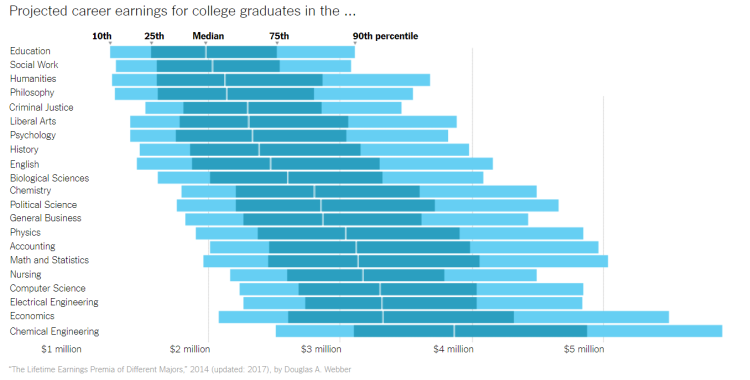What is Economics?
Economics is the study of how individuals, firms, and governments allocate their scarce resources. This major is designed for those who seek a broad understanding of the operation of the economic system and training in the methods and uses of economic analysis. Graduates are equipped for employment in many areas of business operations, labor unions, and agencies of government at all levels, and are prepared to undertake the graduate work necessary to become professional economists. Economists advise presidents, make forecasts about unemployment and the stock market, and create Federal Reserve Bank policies. But economists also study health care, crime, environmental issues, inequality, and more. Perhaps most importantly, economics provides knowledge and logic for making everyday decisions, big and small. This includes everything from where to eat lunch to what career you choose.
Why Study Economics?
You might like this program if:
- you are curious about people and human society, but prefer an analytical, mathematical style of reasoning;
- you want to understand how the world works; and/or
- you like to think about improving the world.
Career Opportunities
The economics major leads to several exciting and well-paying career opportunities in the corporate sector, the public sector, and in the nonprofit sector. This is the case because of the important skills acquired in an economics major including qualitative and quantitative analytical skills, critical-thinking skills, as well as communication skills.
In the corporate sector, economics majors help managers and decisionmakers understand the impact of economic conditions on their businesses. Economics majors analyze issues such as prices and consumer demand, which helps businesses to maximize profit.
In the public sector, economics majors can be found at the federal level as well as at the state and local levels of government. Economics graduates collect and analyze data on employment, prices, productivity, wages, and many other types of data. They also help project revenues and spending needs that help policymakers understand the impact of laws and regulations. Some economics graduates are employed in international agencies, research firms, think tanks, and other nonprofit organizations.
Watch a video from the American Economics Association about careers in economics.
A recent publication by the U.S. Bureau of Labor Statistics lists economics as one of the top well-paying majors overall and top among the arts and social sciences. Economics graduates may work in various occupations including:
- Actuaries or actuarial assistants where they use mathematics and statistics to analyze financial costs of risk and uncertainty.
- Financial Analysts where they use qualitative and quantitative tools to provide guidance to businesses and individual investment decisions.
- Market research analysts where they analyze market conditions and project potential sales for a particular product or service.
- Budget analysts where they help private and public agencies plan their finances more efficiently and effectively.
- Research assistants: economics majors may help design surveys, collect data, analyze the data, prepare reports, and give presentations on a wide range of areas including health issues, labor market issues, environment, social issues, etc.
- Operations research analysts where they employ various mathematical and analytical tools to help private and public agencies solve complicated operations problems.
- Urban and regional planners where they help to develop land use plans to create better communities and accommodate changes in population.
- Policy analysts where they use both qualitative and quantitative analytical skills to identify a problem, analyze the issue, provide a solution, and evaluate competing potential solutions to the problem. Policy analysts may also be tasked with identifying the effects of proposed or implemented policies on various categories of people.
Specifically, our recent graduates have started careers at Vanguard, Oracle, Deloitte, Prudential Financial, Bank of America, Citi, Ernst & Young, J. P. Morgan Chase, Aetna, Accenture, PNC Bank, Bates White, Aramark, Amazon, the Federal Reserve Bank, and the United Parcel Service, among many others.
An economics major will also prepare you well for graduate studies in business. Moreover, economics majors perform better on average than all other majors on the LSAT, the law school admissions exam.
“My take on training in economics is that it becomes increasingly valuable as you move up the career ladder. I can’t think of a better major for corporate CEOs, congressmen or American presidents.”
Robert McTeer, the former President of the Federal Reserve Bank of Dallas.
